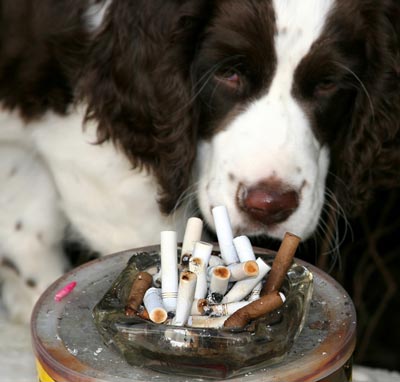Dogs and Second-Hand Smoke

Most people know that smoking tobacco products comes with health risks like respiratory problems, heart disease, and cancer. Did you know that dogs in the homes of smokers are at risk for all of those issues, too?
How Are Dogs Exposed to Cigarette Smoke?
Dogs are exposed to the thousands of toxic chemicals in cigarette smoke in four main ways:
- Second-hand smoke is breathed in when the dog is near a person who is actively smoking.
- Dogs contact third-hand smoke on carpet, furniture, or bedding because the smoke settles onto those surfaces.
- Third-hand smoke is ingested when a dog that has been near a smoking person licks his fur to clean it off.
- Dogs breathe in toxic chemicals when they are in close contact with a smoker's clothing, such as when they are lying on their owner's lap.
How Are Dogs Affected by Smoke?
Studies have shown increased rates of lung cancer, nasal cancer, and sinus cancer in dogs that live with smokers over those that do not. Respiratory problems and heart conditions are probably more common, too.
How Can You Protect Your Dog from Smoke-Related Illnesses?
The best thing you can do is quit smoking or help anyone living in your home who smokes to quit. While you are doing that, here are some ways to decrease your dog's exposure to the smoke:
- Don't smoke or allow smoking inside. If you must smoke inside, keep your dog confined in another room and smoke near an open window.
- Regularly steam clean carpets and upholstery. If someone smokes in your home, you'll also need to clean the walls routinely and pay close attention to keeping your dog's bedding clean.
- Change clothes before cuddling your dog. Don't let your dog snuggle up on your lap until you've changed your clothes, washed your hands, and ideally, washed your hair.
- Don't keep cigarette butts within reach of your dog. They can suffer acute nicotine poisoning if they eat them, which can result in seizures, hallucinations, and death.
If you are struggling to quit smoking, talk with your doctor to get ideas to help you quit and find as much support as possible. You can try Quitza.com to find support from other pet-owners who are quitting.
You May Also Like These Articles:
Slug and Snail Bait Poisoning in Dogs
A Hidden Laundry Room Danger for Dogs: Laundry Pods
Foods Toxic to Dogs - Slideshow
Disclaimer: This website is not intended to replace professional consultation, diagnosis, or treatment by a licensed veterinarian. If you require any veterinary related advice, contact your veterinarian promptly. Information at DogHealth.com is exclusively of a general reference nature. Do not disregard veterinary advice or delay treatment as a result of accessing information at this site. Just Answer is an external service not affiliated with DogHealth.com.
Notice: Ask-a-Vet is an affiliated service for those who wish to speak with a veterinary professional about their pet's specific condition. Initially, a bot will ask questions to determine the general nature of your concern. Then, you will be transferred to a human. There is a charge for the service if you choose to connect to a veterinarian. Ask-a-Vet is not manned by the staff or owners of DogHealth.com, and the advice given should not delay or replace a visit to your veterinarian.



